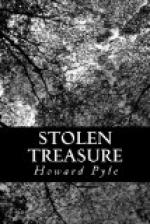Mr. Hartright had been extremely perplexed as to the ownership of the chest of treasure that had been left by those men for Barnaby, but the news of the death of Sir John Malyoe made the matter very easy for him to decide. For surely if that treasure did not belong to Barnaby, there could be no doubt but that it belonged to his wife—she being Sir John Malyoe’s legal heir. Thus it was that he satisfied himself, and thus that great fortune (in actual computation amounting to upward of sixty-three thousand pounds) fell to Barnaby True, the grandson of that famous pirate William Brand.
As for the other case of treasure, it was never heard of again, nor could Barnaby decide whether it was divided as booty among the pirates, or whether they had carried it away with them to some strange and foreign land, there to share it among themselves.
It is thus we reach the conclusion of our history, with only this to observe, that whether that strange appearance of Captain Brand was indeed a ghostly and spiritual visitation, or whether he was present on those two occasions in flesh and blood, he was, as has been said, never heard of again.
IV. A TRUE HISTORY OF THE DEVIL AT NEW HOPE
At the time of the beginning of the events about to be narrated—which the reader is to be informed occurred between the years 1740 and 1742— there stood upon the high and rugged crest of Pick-a-Neck-a-Sock Point (or Pig and Sow Point, as it had come to be called) the wooden ruins of a disused church, known throughout those parts as the Old Free Grace Meeting-house.
This humble edifice had been erected by a peculiar religious sect calling themselves the Free Grace Believers, the radical tenet of whose creed was a denial of the existence of such a place as Hell, and an affirmation of the universal mercy of God, to the intent that all souls should enjoy eternal happiness in the life to come.
For this dangerous heresy the Free Grace Believers were expelled from the Massachusetts Colony, and, after sundry peregrinations, settled at last in the Providence Plantations, upon Pick-a-Neck-a-Sock Point, coadjacent to the town of New Hope. There they built themselves a small cluster of huts, and a church wherein to worship; and there for a while they dwelt, earning a precarious livelihood from the ungenerous soil upon which they had established themselves.
As may be supposed, the presence of so strange a people was entertained with no great degree of complaisance by the vicinage, and at last an old deed granting Pick-a-Neck-a-Sock to Captain Isaiah Applebody was revived by the heirs of that renowned Indian-fighter, whereupon the Free Grace Believers were warned to leave their bleak and rocky refuge for some other abiding-place. Accordingly, driven forth into the world again, they embarked in the snow[1] “Good Companion,” of Bristol, for the Province of Pennsylvania, and were afterwards heard of no more in those parts. Their vacated houses crumbled away into ruins, and their church tottered to decay.




